SUMMARY
This is AI generated summarization, which may have errors. For context, always refer to the full article.
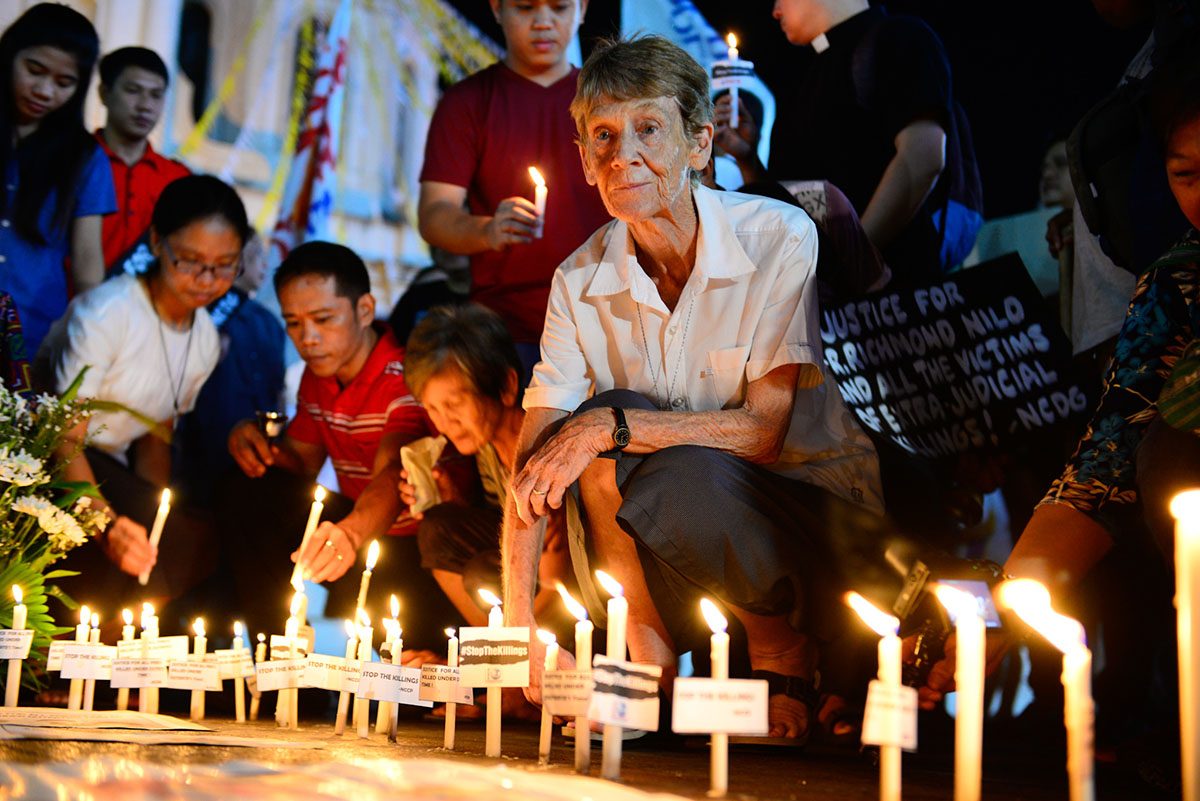
This compilation was migrated from our archives
Visit the archived version to read the full article.
AT A GLANCE
-
The order to deport Australian nun Sister Patricia Fox brings to mind the deportation of foreign missionaries during Martial Law under dictator Ferdinand Marcos
-
Sister Patricia Fox is now the 4th foreign missionary forced to flee the Philippines under President Rodrigo Duterte, following the expulsion of 3 Methodist missionaries for allegedly engaging in political activities
-
The deportation of foreign missionaries is seen as a sign that the Philippines is on the road back to dictatorship
MANILA, Philipppines (UPDATED) – The crackdown on foreign missionaries in the Philippines, like Australian nun Sister Patricia Fox, is déjà vu.
In the 1970s, another foreign missionary angered a dictator’s regime. He was Father Edward Gerlock, an American priest who criticized Martial Law under Ferdinand Marcos, and supported farmers in a land dispute with a banana company.
In October 1973, the Philippine Constabulary arrested Gerlock “on charges of subversion and inducing unrest among peasant farmers and hill tribesmen,” recounted Robert Youngblood in his 1978 journal article, “Church Opposition to Martial Law in the Philippines.”
Gerlock, however, chose to stay in the Philippines, as he argued that his work as a missionary entailed preaching the Good News “to all men at all times whatever the circumstances and consequences.”
He was “cleared of subversion in January 1975,” Youngblood recalled, but the Marcos regime limited the missionary’s moves.
In November 1976, the Marcos regime eventually deported Gerlock, without public hearing, “for participating in several ecumenically organized rallies banned by the government.”
Gerlock, who ended up leaving the priesthood and marrying a Filipina, was not the first foreign missionary to be deported under Marcos.
The role of missionaries is to be with the people in their struggles.
– Sister Patricia Fox
In January 1976, two Italian priests were deported “for assisting squatters,” said Youngblood. This prompted the president of the Catholic Bishops’ Conference of the Philippines, Cardinal Julio Rosales, to say that the Catholic hierarchy will “‘do everything within its power’ to see that foreign priests were not denied due process.”
Earlier, in September 1972, “a nun and 8 priests, 4 of whom were Americans, were detained without charges,” Youngblood said.
In October of the same year, “two American priests, Bruno Hicks and John Peterson, were voluntarily deported for activities involving a church radio station on the island of Negros.” The two priests “were accused of advocating rebellion over the radio.”
It was strategic for Marcos to crack down on foreign missionaries like them.
Youngblood explained that within religious orders, foreign missionaries had “most often spoken out against the regime.” He said priests, nuns, and foreign missionaries from religious orders bore “the brunt of government crackdowns” that “included deportations, jailings, and the closing of church newspapers and radio stations.”
Fast-forward to 2017, history is repeating itself.
Two years after Duterte took office, Fox is now the 4th foreign missionary forced to leave the Philippines for supposedly engaging in political activities. Critics see Duterte doing a Marcos by stifling the Catholic Church, one of the most credible voices against dictatorship.
Chilling effect
Marcos had been out of office for 4 years when Fox first arrived in the Philippines in 1990. The dictator was ousted through the 1986 EDSA People Power Revolution with the help of then-Manila archbishop Jaime Cardinal Sin.
For 27 years since her arrival, the 72-year-old Fox lived a missionary’s normal life. She stayed with tribes, spoke with workers, fought for their rights. It came to a point that she was detained in 2013, but was released without charges, for joining protests in Hacienda Luisita, which is owned by the family of then president Benigno Aquino III.
But what happened to her under Duterte was unimaginable.
On April 16 this year, the Bureau of Immigration (BI) arrested and detained Fox for allegedly joining “political activities.” She was released 24 hours after her arrest, but was later subjected to deportation proceedings.
On April 18, Duterte admitted that he himself ordered the BI to investigate Fox.
This was after Fox joined a fact-finding mission in Mindanao in April, which sought to investigate the killings of farmers in the southern Philippines. Fox allegedly participated in other rallies.
Eventually, the BI on April 23 forfeited Fox’s missionary visa and separately on July 19 ordered her deportation. Fox’s deportation is now under appeal before the Department of Justice.
In the meantime, Fox’s missionary visa expired on September 5.
She had applied on August 20 to renew her missionary visa, but on September 13, the BI denied her request. Fox, also a lawyer, promptly appealed the BI’s decision.
The BI also denied Fox’s appeal to have her missionary visa extended. The BI downgraded her visa to a 59-day tourist visa.
Fox was then forced to leave the Philippines on Saturday, November 3.
Fox explained to Rappler on September 6, why she chooses to stay in the Philippines, and not to just return to Australia for a more peaceful life.
“I’ve been here for a long time, and I really like being here, but it’s also about the principle of the case, because it’s the issue of them trying to confine foreign missionaries to the barangay (village) and not to be involved with the people,” Fox said.
“The role of missionaries is to be with the people in their struggles,” she said.
Inevitably, however, Fox’s plight has created a chilling effect on other foreign missionaries in the Philippines. “Yeah, I think it has. People worry, especially if they say that foreign missionaries should only work in the barangays,” Fox said.
Methodists deported, too
Before Fox, 3 Methodist missionaries were already deported from the Philippines under Duterte.
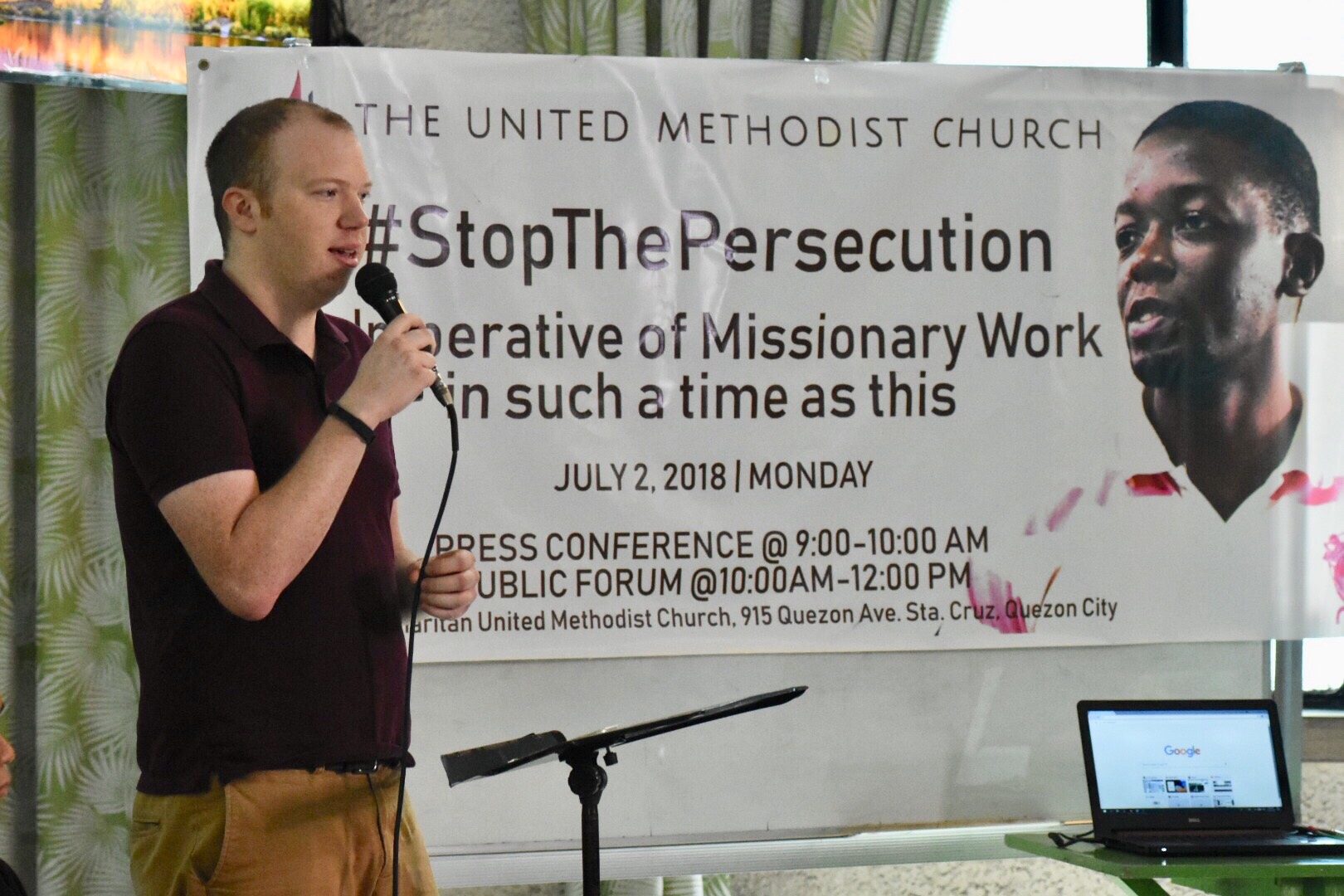
The BI on July 3 confirmed ordering the deportation of these Methodist missionaries who, like Fox, allegedly engaged in political activities.
- Tawanda Chandiwana of Mutare, Zimbabwe
- Adam Thomas Shaw of Brunswick, Ohio, USA
- Miracle Osman of Blantyre, Malawi
Chandiwana and Shaw were also accused of overstaying. The 3 left the Philippines one after the other in July.
But before the BI freed him, Chandiwana even spent more than 8 weeks in detention.
In the Philippines, Chandiwana worked for InPeace, an interfaith group working for peace and justice. InPeace is based in Davao City, where Duterte ruled as mayor for more than two decades.
Chandiwana and Shaw ran into trouble after they joined a fact-finding mission on alleged human rights abuses in Mindanao.
The activity that got them into trouble was “an International Fact-Finding and Solidarity Mission” on February 22 “to look into the human rights violations in Mindanao,” said the Board of Church and Society of the Methodists’ Philippines Central Conference.
Chandiwana and Shaw, along with human rights advocates, were then looking into the so-called Lake Sebu massacre of December 3, 2017.
In the Lake Sebu incident, soldiers allegedly killed tribal chieftain Datu Victor Danyan and 7 other Lumad tribe members. The military said it was a legitimate encounter with communist rebels, but Senator Loren Legarda cited witnesses who claimed it was a “massacre” and that Danyan was not a communist rebel.
If Chandiwana and Shaw were involved in the Lake Sebu mission, what was the accusation against Osman?
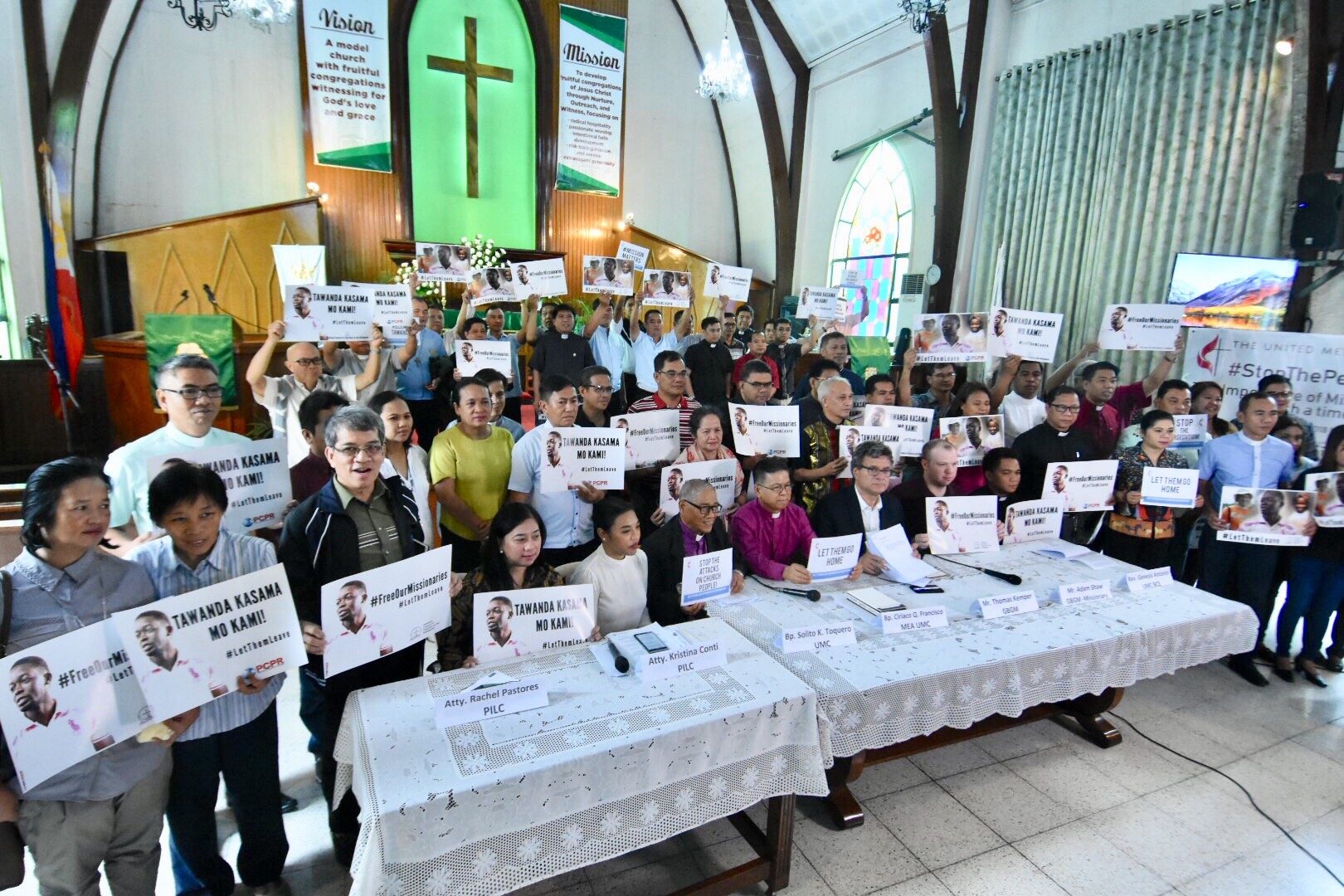
Osman’s lawyer, Kristina Conti of the Public Interest Law Center, said Osman was ordered to leave for joining a “fact-finding mission” in Mindanao.
The problem? Conti said the accusation is false “because they also included her in the Lake Sebu fact-finding team.” Conti clarified that Osman “was with another team, in another site.”
‘Road to dictatorship’
It is important to note, Conti said, that all these have been happening “in the context of the numerous wars, the bloodlust, the blood thirst, of this government,” putting all Filipinos and non-Filipinos in the Philippines “in danger.”
Referring to missionaries, she added, “But for this specific segment that was called upon by the Church, by God, to help us all spread the Word of God, to spread kindness, it is most abominable.”
BI spokesperson Dana Krizia Sandoval denied there is a crackdown on foreign missionaries in the Philippines.
“In fact, there are currently more than 500 lawful missionary visa holders in our records, and we welcome and appreciate their presence, as long as the visa is not abused for purposes of joining partisan political activities,” Sandoval said on July 3.
The government’s critics remain unconvinced.
In a press conference on July 2, Methodist Bishop Ciriaco Francisco was asked if the Philippines is now on its way to a dictatorship, given that things like this also happened during the Marcos regime.
“I think that’s the preparation for the road to dictatorship,” Francisco said. “We can see it everywhere, the way the government is dealing with issues, trying to impose what they want.”
The Duterte administration is moving against religious personalities, Ciriaco explained, because “it’s the religious sector that empowers the poor.”
He said it seems “that the government is against the poor fighting for their rights. Referring to religious personalities, Francisco said, “They are targeted by the government, to silence them.”
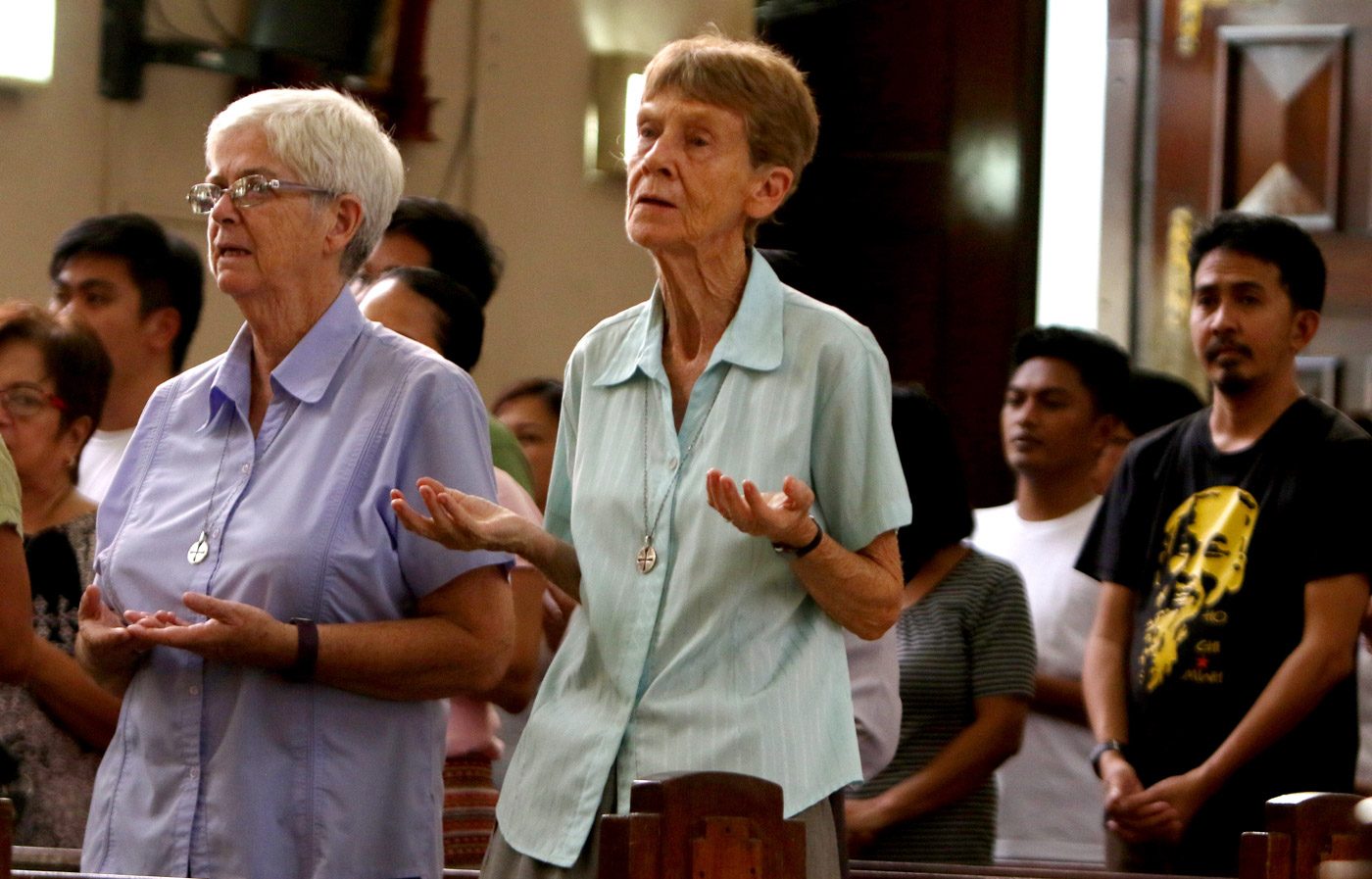
Catholic priest Father Oliver Castor, spokesperson of the Rural Missionaries of the Philippines, earlier pointed out that Marcos also had Columban missionaries deported during his dictatorship.
“Itong ginagawa ni Duterte sa simbahan ay ginawa ni Marcos (What Duterte is doing to the Church was also done by Marcos),” Castor said.
“Let us speak out,” he said. “Let us not just take this sitting down.”
Fox’s lawyer, Jobert Pahilga, said their camp is “not optimistic” that their appeal against her deportation will be granted.
“Medyo hindi kami positibo na maga-grant kasi it was the President himself na nagsabi na gusto niyang paalisin si Sister Pat (We’re not optimistic that it will be granted because it was the President himself who said he wants to expel Sister Pat),” Pahilga told reporters.
“Sa tingin namin, hanggang si Presidente Duterte ang nakaupo eh mahihirapan si Sister Pat na makakuha ng extension ng kanyang missionary visa (We think that until President Duterte is in power, Sister Pat will find it difficult to get an extension of her missionary visa),” he added.
Still, Pahilga said, their camp “will still avail of all the legal remedies.”
Fox said she hopes that “somewhere along the way, we’ll look at the issues, the legal issues.” And she hopes the government will “come out with a decision that’s not just based on what they say the President said.” – Rappler.com
TOP PHOTO: DEPORTATION CASE. Australian nun Sister Patricia Fox holds a press conference on July 20, 2018, about the deportation order by the Bureau of Immigration against her. Photo by Maria Tan/Rappler
Add a comment
How does this make you feel?



![[Just Saying] Diminished impact of SC Trillanes decision and Trillanes’ remedy](https://www.rappler.com/tachyon/2024/04/Diminished-impact-of-SC-Trillanes-decision-and-remedy.jpg?resize=257%2C257&crop=273px%2C0px%2C720px%2C720px)
![[Rappler Investigates] Son of a gun!](https://www.rappler.com/tachyon/2024/03/newsletter-duterte-quiboloy.jpg?resize=257%2C257&crop=450px%2C0px%2C1080px%2C1080px)

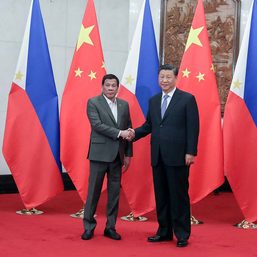

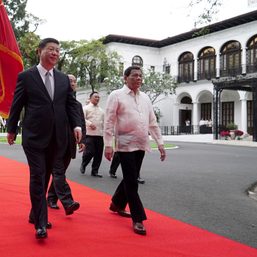
There are no comments yet. Add your comment to start the conversation.